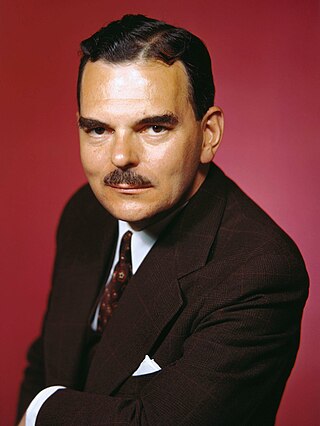
Thomas Edmund Dewey was an American lawyer and politician who served as the 47th governor of New York from 1943 to 1954. He was the Republican Party's nominee for president of the United States in 1944 and 1948, losing the latter in a major upset to Harry S. Truman. The 288 combined electoral votes Dewey received from both elections place him second behind William Jennings Bryan as the candidate with the most electoral votes who never acceded to the presidency.

Charles "Lucky" Luciano was an Italian-born gangster who operated mainly in the United States. Luciano started his criminal career in the Five Points Gang and was instrumental in the development of the National Crime Syndicate. Luciano is considered the father of modern organized crime in the United States for the establishment of the Commission in 1931, after he abolished the boss of bosses title held by Salvatore Maranzano following the Castellammarese War. He was also the first official boss of the modern Genovese crime family.

Frank Costello was an Italian-American crime boss of the Luciano crime family. In 1957, Costello survived an assassination attempt ordered by Vito Genovese and carried out by Vincent Gigante. However, the altercation persuaded Costello to relinquish power to Genovese and retire. Costello died on February 18, 1973.

The Cotton Club is a 1984 American musical crime drama film co-written and directed by Francis Ford Coppola and based on James Haskins' 1977 book of the same name. The story centers on the Cotton Club, a Harlem jazz club in the 1930s. The film stars Richard Gere, Gregory Hines, Diane Lane and Lonette McKee, with Bob Hoskins, James Remar, Nicolas Cage, Allen Garfield, Gwen Verdon, Fred Gwynne and Laurence Fishburne in supporting roles.

The Cotton Club was a New York City nightclub from 1923 to 1940. It was located on 142nd Street and Lenox Avenue (1923–1936), then briefly in the midtown Theater District (1936–1940). The club operated during the United States' era of Prohibition and Jim Crow era racial segregation. Black people initially could not patronize the Cotton Club, but the venue featured many of the most popular black entertainers of the era, including musicians Fletcher Henderson, Duke Ellington, Jimmie Lunceford, Chick Webb, Louis Armstrong, Count Basie, Fats Waller, Willie Bryant; vocalists Adelaide Hall, Ethel Waters, Cab Calloway, Bessie Smith, Lillie Delk Christian, Aida Ward, Avon Long, the Dandridge Sisters, the Will Vodery choir, The Mills Brothers, Nina Mae McKinney, Billie Holiday, Midge Williams, Lena Horne, and dancers such as Katherine Dunham, Bill Robinson, The Nicholas Brothers, Charles 'Honi' Coles, Leonard Reed, Stepin Fetchit, the Berry Brothers, The Four Step Brothers, Jeni Le Gon and Earl Snakehips Tucker.

Dutch Schultz was an American mobster based in New York City in the 1920s and 1930s. Schultz made his fortune in organized crime-related activities, including bootlegging and the numbers racket. Schultz's rackets were weakened by two tax evasion trials led by prosecutor Thomas Dewey, and also threatened by fellow mobster Lucky Luciano.
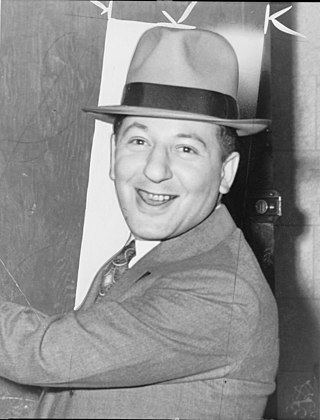
Louis Buchalter, known as Louis Lepke or Lepke Buchalter, was an American mobster and head of the Mafia hit squad Murder, Inc., during the 1930s. Buchalter was one of the premier labor racketeers in New York City during that era.
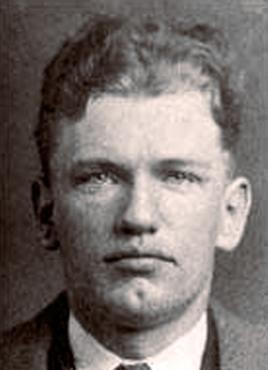
Vincent "Mad Dog" Coll was an Irish-American mob hitman in the 1920s and early 1930s in New York City. Coll gained notoriety for the alleged accidental killing of a young child during a mob kidnap attempt.

Ellsworth Raymond "Bumpy" Johnson was an American crime boss in the Harlem neighborhood of New York City.
The numbers game, also known as the numbers racket, the Italian lottery, Mafia lottery or the daily number, is a form of illegal gambling or illegal lottery played mostly in poor and working-class neighborhoods in the United States, wherein a bettor attempts to pick three digits to match those that will be randomly drawn the following day. For many years the "number" has been the last three digits of "the handle", the amount race track bettors placed on race day at a major racetrack, published in racing journals and major newspapers in New York.
Quoting out of context is an informal fallacy in which a passage is removed from its surrounding matter in such a way as to distort its intended meaning. Context may be omitted intentionally or accidentally, thinking it to be non-essential. As a fallacy, quoting out of context differs from false attribution, in that the out of context quote is still attributed to the correct source.

Billy Bathgate is a 1991 American biographical gangster film directed by Robert Benton, starring Loren Dean as the title character and Dustin Hoffman as real-life gangster Dutch Schultz. The film co-stars Nicole Kidman, Steven Hill, Steve Buscemi, and Bruce Willis. Although Billy is a fictional character, at least four of the other characters in the film were real people. The screenplay was adapted by British writer Tom Stoppard from E.L. Doctorow's 1989 novel of the same name. Doctorow distanced himself from the film for the extensive deviations from the book. It received negative reviews and was a box office bomb, grossing a mere $15.5 million against its $48 million budget.
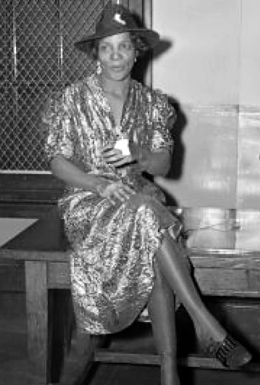
Stephanie St. Clair was a racketeer who ran numerous enterprises in Harlem, New York in the early 20th century. St. Clair resisted the Mafia's interests for several years after Prohibition ended; she became a local legend for her public denunciations of corrupt police and for resisting Mafia control. She ran a successful numbers game in Harlem and was an activist for the black community. Her nicknames included: Queenie, Madame Queen, Madame St. Clair and Queen of the Policy Rackets.

Jewish-American organized crime initially emerged within the American Jewish community during the late 19th and early 20th centuries. In media and popular culture, it has variously been referred to as the Jewish Mob, the Jewish Mafia, the Kosher Mob, the Kosher Mafia, the Yiddish Connection, and Kosher Nostra or Undzer Shtik. The last two of these terms are direct references to the Italian cosa nostra; the former is a play on the word for kosher, referring to Jewish dietary laws, while the latter is a calque of the Italian phrase 'cosa nostra' into Yiddish, which was at the time the predominant language of the Jewish diaspora in the United States.
The Commission is the governing body of the American Mafia, formed in 1931 by Charles "Lucky" Luciano following the Castellammarese War. The Commission replaced the title of capo di tutti i capi, held by Salvatore Maranzano before his murder, with a ruling committee that consists of the bosses of the Five Families of New York City, as well as the bosses of the Chicago Outfit and, at various times, the leaders of smaller families, such as Buffalo, Philadelphia, Detroit, and others. The purpose of the Commission was to oversee all Mafia activities in the United States and serve to mediate conflicts among families.

Abraham "Bo" Weinberg was a Jewish New York City mobster who became a hitman and chief lieutenant for the Prohibition-era gang boss Dutch Schultz. As Schultz expanded his bootlegging operations into Manhattan during Prohibition, he recruited Abe Weinberg and his brother George into his gang. Abe Weinberg would become one of Schultz's top gunmen during the Manhattan Bootleg Wars and was a suspect in the later high-profile gangland slayings of Jack "Legs" Diamond, Vincent "Mad Dog" Coll, and mob boss Salvatore Maranzano.
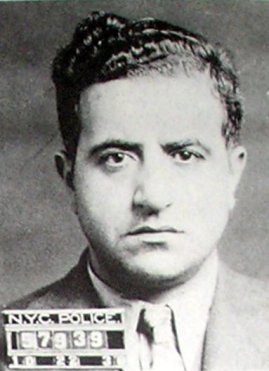
Umberto "Albert" Anastasia was an Italian-American mobster, hitman and crime boss. One of the founders of the modern American Mafia, and a co-founder and later boss of the Murder, Inc. organization, he eventually rose to the position of boss in what became the modern Gambino crime family. He also controlled New York City's waterfront for most of his criminal career, mainly through the dockworker unions. Anastasia was murdered on October 25, 1957, on the orders of Vito Genovese and Carlo Gambino; Gambino subsequently became boss of the family.













